8h. Train station of Agra. Our time is short here as we get off the train. One day and a half and our plan is full with the differents places we want to see. We trust a tuk-tuk's driver that offers us to drive us at the castle of Fatehpur Sikri, 40km away from the city. We'll meet in one hour, just a moment to have breakfast from the rooftop of the guesthouse with a nice view on the Taj Mahal. Despite the relative distance, its whiteness is radiant and splashes down all the other buildings. Dwellings are nothing but pale, tasteless houses dramatically crushed by the marble mausoleum. We forget what we have in the plate. Our last steps in India are going to be magical.


We go for the castle of Fatehpur Sikri. Despite the undeniable beauty of its outlines, my thoughts turn back to Agra and the desire of trudging in the gardens and on the marble floor of the white mausoleum. Our visit at the castle is short and we go back to Agra.












As we arrive, we stop at the red fort. Well-preserved, Agra can vie with the innumerable castles scattered in the Rajasthan state. The lawns and gardens bring out the straight and vertical lines of the red fortress. The interior of the fort is composed of myriad of rooms that look out onto one another. They are sometimes separate by some interior courtyards. A part of the fortification flanks the river and several openings turn our looks towards the opposite bank. The Taj Mahal's outline looms in the distance among lands barely spoilt by the human hand. My eyes are magnetized by this white monument. An obsession since I arrived in India that changed into unbearable desire since I got off the train.










We keep on visiting the monuments of Agra with the baby Taj Mahal. We cross the river and stop in front of this replica of its illustrious "big brother". Just a sample before dashing to the Taj Mahal.




We go alongside the river by tuk-tuk. A few meters by foot, we race down from the small embankment and our looks set on the white-radiant funerary palace. The river separates us from the backside of the mausoleum. The quintessence of the moghul art reflects the last glows of the sun. A spike-ended dome walled by 4 minarets and hemmed in by 2 brick red mosques. We tread along the bank to contemplate the monument from different angles. Harmonious proportions and calming colours. One of these architectural jewels the History bequeathes to the Humanity. One of these treasures which beautifies the brochures of the travel agencies. And however, despite all the photographies taken by the best photographers, the emotion is there, intact. Perfect symmetry between the 2 mosques that embrace the mausoleum and marvellous reflection into the calm waters of the river. The marble palace floats above the time, above the reality. So do we.
Little by little, the mausoleum darkens with the veil of the night.






Keyword - retinian burnt -
Sunday 14 October 2007
Monuments around Agra
By dorian on Sunday 14 October 2007, 22:08 - RTW-India
Tuesday 2 October 2007
The pilgrimage of the Sikhs to the golden temple
By dorian on Tuesday 2 October 2007, 14:30 - RTW-India
Amritsar is for the Sikhs what Mecca is for the Muslims, a holy city. Once in their life, the Sikhs have to carry out a pilgrimage to the golden temple.
Chorus of honks, tangle of bicycles, rickshaws and horse-towed carts welcome us. First images of a milling, life-seething town. A forgotten atmosphere since we went off to Himachal Pradesh in exile. The Indian truth resurfaces again. In the streets, thick beards on smiling faces topped by firmly swaddled turbans. The Sikhs, a bewildering religion.


On the way to the golden temple, we stop in front of cages full of chicks. Further to genetic modifications, they wear colours oddly different from the common yellow. Actually, the invigorating dyes aren't only for the Hindu women's saris...

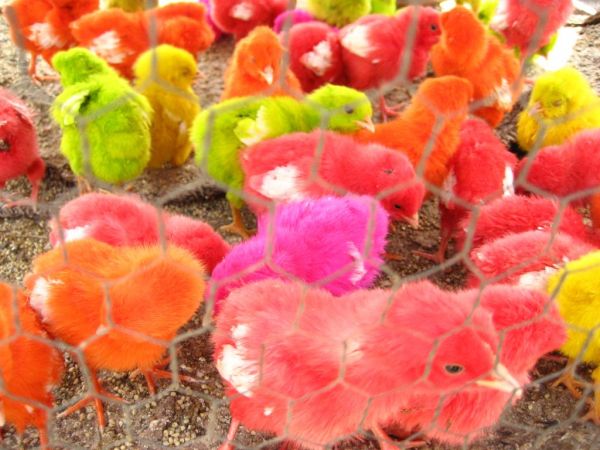
We draw near the enclosure of the temple whose one of the gilded cupolas drift above the drab and filthy street. Other white-angel-like domes break away from the muddled alleyways we step on. We take our shoes off, don a scarf on the head and get into the holy area. A mesmerizing music surrounds the holy place and hundreds of followers tread around the artificial rectangular lake. Some of them purify themselves into its waters while others line up to visit the golden temple.
This quite recent religion is definitely baffling but offers us an architectural jewel, a temple covered with glistening golden leaves when richly coloured pilgrims with turquoise, pink and orange shades soak in this musical and religious aura.

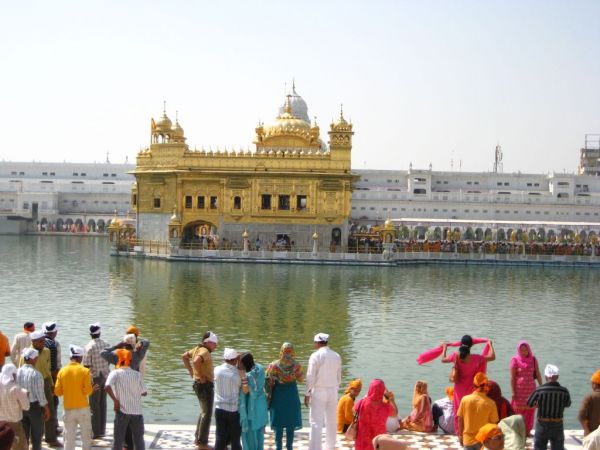

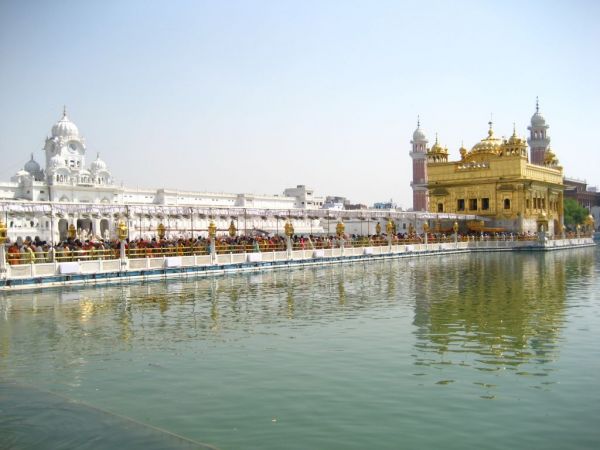


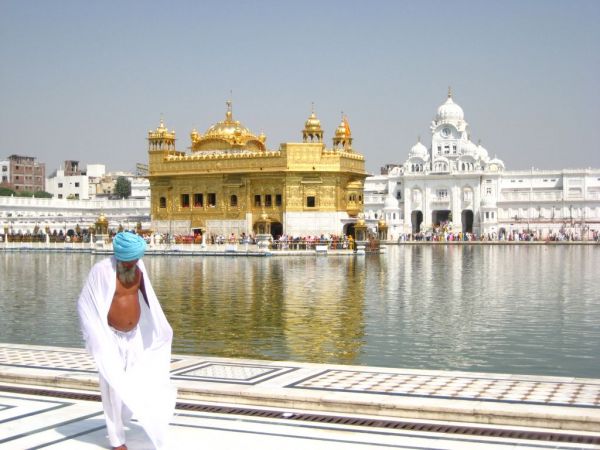
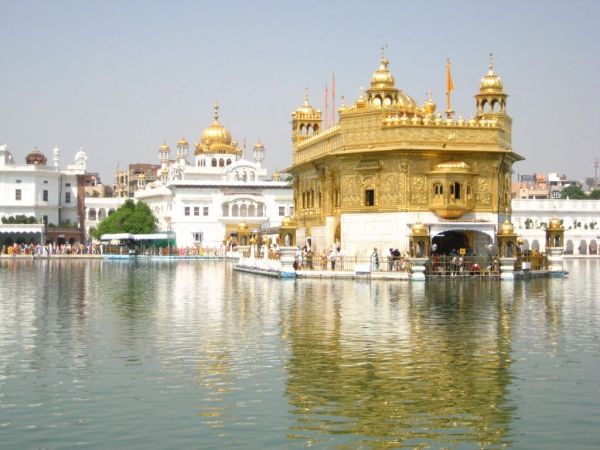



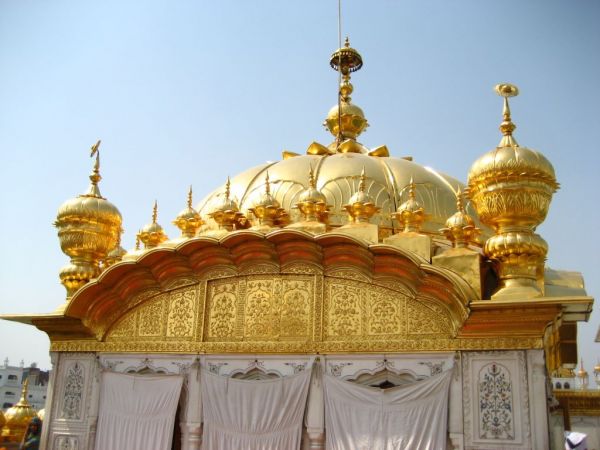


Wednesday 12 September 2007
Panorama on the Annapurnas
By dorian on Wednesday 12 September 2007, 18:47 - RTW-Nepal
A short stop in Kathmandu to get the Indian visa before leaving to Pokhara and the protected area of the Annapurnas. The most mythical treks are called the Annapurnas circuit in 17 days or the Annapurnas sanctuary in 12 days. But I don't have enough time to step on of these trips and a travel agency in Kathmandu offers me a 6-day trek, "the Annapurnas panorama". I make Gyan Gurung's acquaintance who comes with me for these 6 days. A about-50-year smiling small Nepali.
The next day in the morning, departure to Pokhara, a 7-hour bus journey. En route, we drop a few tourists off at Dumre ; from there, they'll go to Besi Sahar and start the Annapurnas circuit. At Pokhara, the hostels string along the lake. Relaxing atmosphere far from the hubbub of Kathmandu. A panoramic photo hanging at the wall of the guesthouse reception leaves me wondering. With a clear weather, the lake reflects the 7000 and 8000-metre giants of the area but I must satisfy myself with the wall picture.
I wander around in the tourist street of Pokhara before getting my permit for the protected area of the Annapurnas. A simple pass to get in the park. I devour a dish of spaghetti before falling asleep, the soul sprinkled with eternal snow. Tomorrow, it's the D-day.
Day 1 : Naya Pul => Hile
A local minivan drops us off at Naya Pul, 1h30 from Pokhara. We put our bags onto our shoulders and we disappear into the alleyways maze of the village. First monkey bridge to cross the river and record to the park authorities. You must register your journey, your name and the numbers of the days inside the park.

A path fades into the distance. I'm happy to rub my shoes ontot the muddy trails of this gorgeous Nepali nature. We walk along the river. The monsoon rains wreak havoc. The path is sometimes impassible and we must cross the turbulent waters of the river to carry on pacing on the other bank. This first stage is short and we arrive at the village of Hile. A pile of corrugated sheet metal on multicoloured wooden frame with various signs : restaurant, guesthouse, delicious food, hot shower. The monsoon is synonymous with low season, and I'm the only one in this gathering of guesthouses. And for 1 euro a night, it would be a pity to cart the tent around. The laid-back atmosphere lets me realize the pleasure to be here. To look at the terraced fields of the opposite hill disappearing while the twilight goes down.
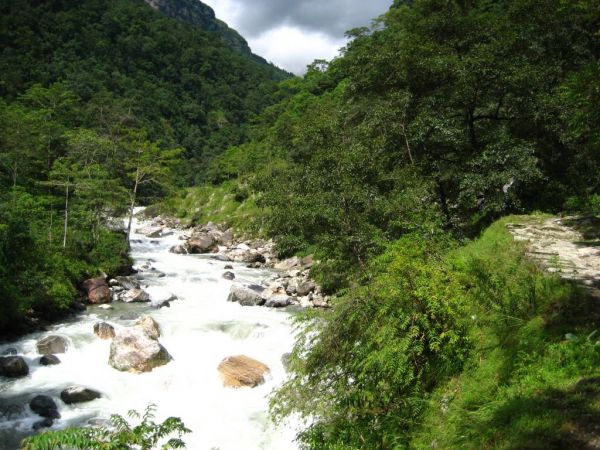







Day 2 : Hile => Ghorapani
Steps and steps again. An exhausting ascent which pulls me out liters of sweat. Difference of height : 1200m. More or less high, wood or stone, stairs became a leitmotiv. The head raises to peer what happens next but it's often with a low and shifty look it draws on its energy to order the legs to lift and go forward. Big drops stream down on my face and crash on the stone steps. The eyes forget the surrounding scenery and all the energy runs into the quadriceps. The suffering reads on the other madmen's face who came to the hard nature of the Annapurnas searching a bit of relaxation and cool air. Ghorapani. An incomparable satisfaction overwhelms me when I take off my shoes and hang my socks that keep the fruits of the effort among its stitches. In front of me, the mountains are not there. Where are the Annapurnas and the Dhaulagiri ? Behind the thick curtain of clouds. The comfort of a chair and a meal of pasta fully satisfy me.













Day 3 : Ghorapani => Tadapani
The alarm-clock rings. The dial displays 5h. I bend my head through the window and nothing sparkles in the sky. We cancel the morning ascent to Poon Hill, promontory to contemplate the sunrise over the snow-capped massif. At a more decent time to get up, azure-hued windows break through the greyish wall. The majestic Dhaulagiri and Annapurna I loom. I give a withering look at the ridges and spurs of the Annapurna I and start thinking of Maurice Herzog and Louis Lachenal who 50 years ago became the first alpinists succeeding in the ascent of a 8000-meter-plus peak. The desire of reading the story of this adventure devours me. A small library in Ghorapani luckily has a copy relating the saga of the French expedition : "Annapurna, first 8000m". The precious book at the bottom of my rucksack, we venture on a new section of stairs.




3000m high, a disused refreshment stand mingles with the sadness of the weather. Our wait will change no way. We get in a forest of rhododendrons. Twisting bodies which vivid-shaded flowers extend when the spring comes. River and waterfalls, majestic trees among a coulis of downy clouds, corniche stroll. The menu is mouth-watering. And for this trek I thought walking into the snow, onto a sterilized ground, onto uneven stones. Nothing of these, a green and twirling nature. A crystal-clear water that fills the ears when the eyes are busy to check where the feet land. Overdose of colours. The path plays with the water. Timber logs straddle the river and we leap from a bank to another.






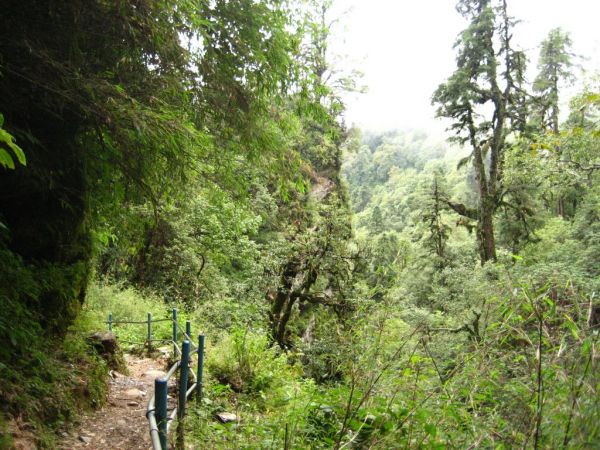





Arrival at Tadapani, my eyes finally rest coming and going on the first lines of the adventure of Maurice Herzog. The sacred moutain of the Machhapuchhare breaks through the horizon. Silence... A band of admirers have just stood up. The snows of the Annapurna south twinkle. Still silence... The orangeay shade get thicker up to fade into the darkness of the nascent night. The pages of the book come and go endlessly.
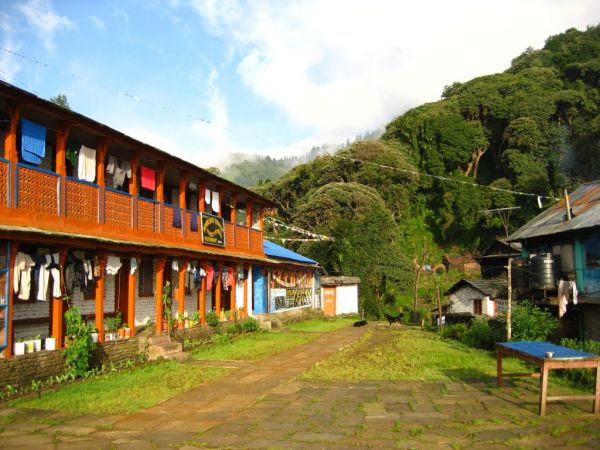











Day 4 : Tadapani => Landruk
The trunks of the rhododendrons start again their waltz. A young Nepali takes off the numerous leeches hanged at his bloodstained feet. Luckier, I would only have 2. A little bit further, a buffalo shows us the ability of these horrible beings to drink blood. The diameter of these awful beasties has swollen from one millimeter to more than one centimeter. As for the eyes, they don't make a mistale. The spectacle is more aerial. Jungle and mountains. Lovely oxymore.







Day 5 : Landruk => Pothana
Short day. A simple stroll. The jungle fades into the distance and the rice fields loom. I finish the Himalayan saga of Maurice Herzog and Louis Lachenal who a certain 3rd of june 1950 opened the run to the conquest of the 8000-meter-plus peaks.


Day 6 : Pothana => Phedi => Pokhara
We reach the village of Dhampus and embark on a long walk down toward Phedi. The spectacle of the Annapurnas close. I live my last moments with my guide Gyan Gurung I'm attached to. But on the way back to Pokhara, sitting in this tottering coach, I fall asleep. And I am firmly convinced these mythical paths on the spurs of the Himalaya will see again my Vibram soles and Gyan Gurung will join in...
End of the Nepali adventures...
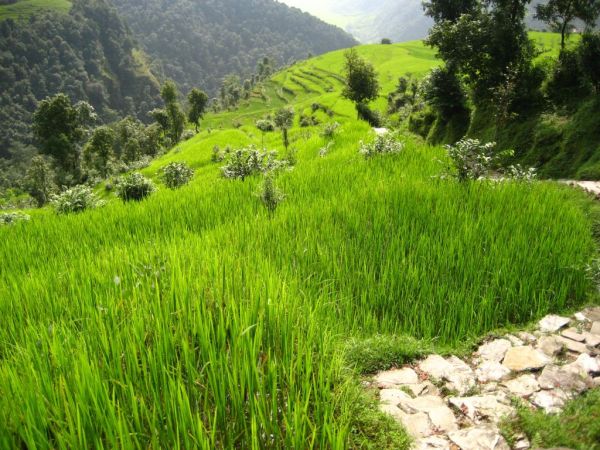

« previous entries - page 5 of 6 - next entries »




